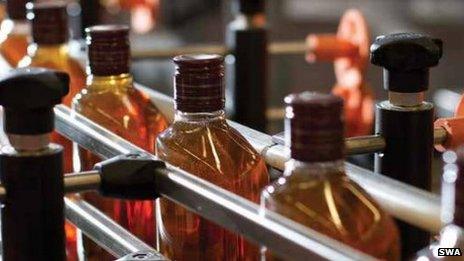Tackling the Scotch whisky imitators
- Published
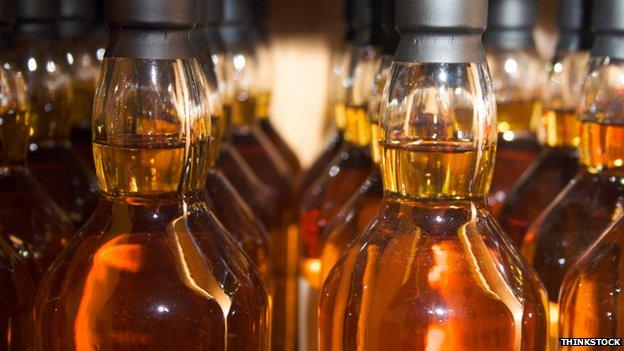
It's been a great decade for Scotch whisky, with Scotland's 115 distilleries working around the clock to quench the thirst of drinkers in 200 markets worldwide.
Nearly 40 bottles of Scotch are now shipped overseas each second, contributing nearly £4bn to the UK's balance of payments.
But its success has come at a price.
The Scotch Whisky Association (SWA) now works 24/7 blocking attempts by companies around the world to pass off their products as "Scotch" in order to boost their own profits.
In a new report, the industry body revealed proceedings were authorised against 19 different brands last year, covering Belgium, China, Curacao, Ecuador, France, Germany, India, New Zealand, the Netherlands and Scotland.
Scotch whisky is protected as a Geographical Indication (GI), meaning it can only be produced in Scotland, according to UK rules.
But that hasn't stopped imitators, who have come up with ingenious ways to try to get around protection laws.

Scotch whisky facts and figures 2014
•Exports generated about £3.95bn - the equivalent of £125 every second
•Thirty-eight bottles bottles were shipped overseas each second
•More than 10,000 people are directly employed in the industry
•Some 115 distilleries are licensed to produce Scotch
•Scotch whisky accounts for around a quarter of all UK food and drink exports
Source: Scotch Whisky Association

SWA director of legal affairs, Magnus Cormack, says his organisation currently has 60 to 70 active legal cases in 30 different countries, as well as about 300 trademark oppositions in upwards of 20 nations.
He says issues can range from simple fraud - passing off drinks as Scotch whisky when they are not - to subtle attempts to dress up products to look like Scotch.
Last year it acted against a brand called Highlander in Bulgaria.
The labelling stated that the product was a "Grain Alcoholic Drink with Malt", depicted a Scottish bagpiper in full Highland dress and used one of Scotland's most famous castles, Eilean Donan, as its background.
Having reached the conclusion that the product was being passed off as Scotch whisky, legal proceedings were taken against the company before the Sofia City Court. The SWA succeeded in having the Highlander mark removed from the country's trademark register.
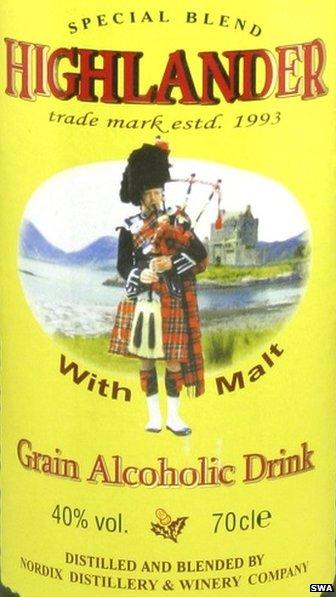
SWA took action against this labelling in Bulgaria
"The means by which somebody can pretend that a product is Scotch whisky defy numeration," says Mr Cormack.
"Sometimes it will be very subtle indeed - it may just be the use of an English language brand name in a country where English is not the main language spoken. In those countries, people assume that a whisky labelled in English must be a Scotch whisky."
SWA's legal department has a team of eight working on protecting Scotch, including five lawyers.
It also employs a specialist trademark watching service which generates about 400 alerts per month from all over the world.
In addition, it picks up information from Scotch whisky producers who have spotted potentially fake products in overseas markets.
"With the litigation internationally we have to draw on the expertise of lawyers in other countries to actually do the groundwork," says Mr Cormack.
"I like to put it by saying that we fashion the bullets and the lawyers abroad fire them."
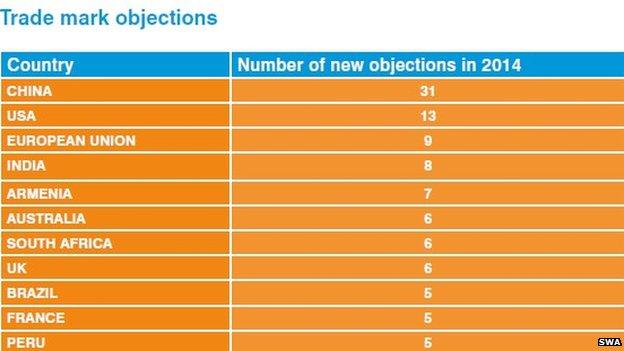
SWA raised dozens of trademark objections around the world last year
India has kept the lawyers busier than most other countries over the past decade. SWA is currently opposing more than 100 trademark applications there.
Last year, SWA launched a court action over the proposed launch of an Indian whisky with the name Scotia Imperial, or Scosia Imperial, which also featured a tartan design.
The company involved claimed that, according to the dictionary, "Scotia" was an architectural term relating to "a concave moulding, especially at the base of the column" and that "in conventional distilleries the distillation columns have a concave base".
It also argued that "every design with a pattern consisting of criss-crossed horizontal and vertical is not a tartan design".
SWA subsequently secured a court order which included a ban on the drink producer using the words "Scotia" or "Scosia" or any tartan design on any whisky other than Scotch.
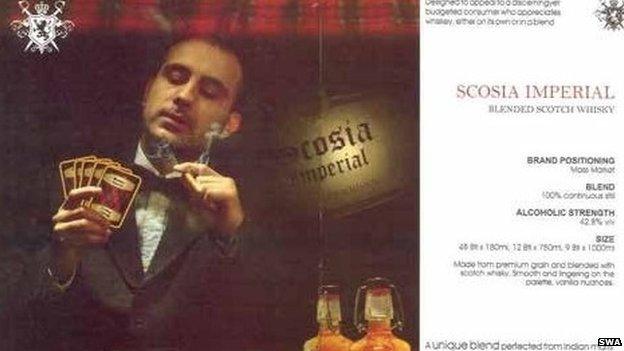
SWA secured a court order against the makers of "Scosia Imperial"
Mr Cormack says: "There are a number of ingenious arguments that people come up with.
"My favourite is a brand in India called Scotch Terrier. The defendant in that particular case argued that this had nothing to do with trying to pass the product off as Scotch whisky, it was just the name of his dog.
"The court did not accept that argument."
But problems can also arise in more mature markets.
According to Mr Cormack, Australian local authorities have been reluctant to take action against companies accused of producing fake whisky, forcing the trade body to take on litigation by itself.
He added: "In other countries we find that we can rely very heavily on the administrative authorities.
"China is a good example. As the Chinese market took off, so imitators followed. A lot of products were falsely described as Scotch whisky and we would report those to the local authorities, who would take action.
"And in China the penalties can be quite high and people can go to prison. So that's been quite a deterrent factor."
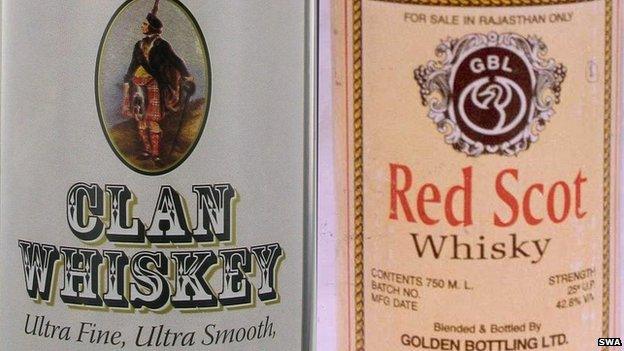
The SWA regularly faces examples of drinks producers using Scottish images and terms to suggest a drink is Scotch
Mr Cormack agrees that SWA's attempts to stamp out deceptive behaviour can resemble the old arcade game whack-a-mole.
"That is a very fair analogy," he says. "Sometimes we will take action against a particular company and a particular brand, and the company will re-emerge in another guise with another brand and we have to do it all over again.
"There are certain companies that we've had to take proceedings against on a number of occasions, and each time the penalty the company suffers tends to get higher, and we hope that eventually they will see that the profits are not worth it, or non-existent."
Mr Cormack adds: "The value of the brand Scotch whisky is really incalculable.
"At the moment Scotch whisky can only be produced in Scotland.
"If the geographic description Scotch whisky came to mean simply that it was just a type of whisky which could be distilled anywhere, that would be a disaster for the Scottish economy and for the British economy.
"It's what happened to London Gin. At one time it was only produced in London - now it just means a type of gin which is produced worldwide, and London distillers have missed out on an opportunity.
"So I think the value of protecting Scotch whisky is essential. But for a protected name, there would be no industry."
- Published28 January 2015
